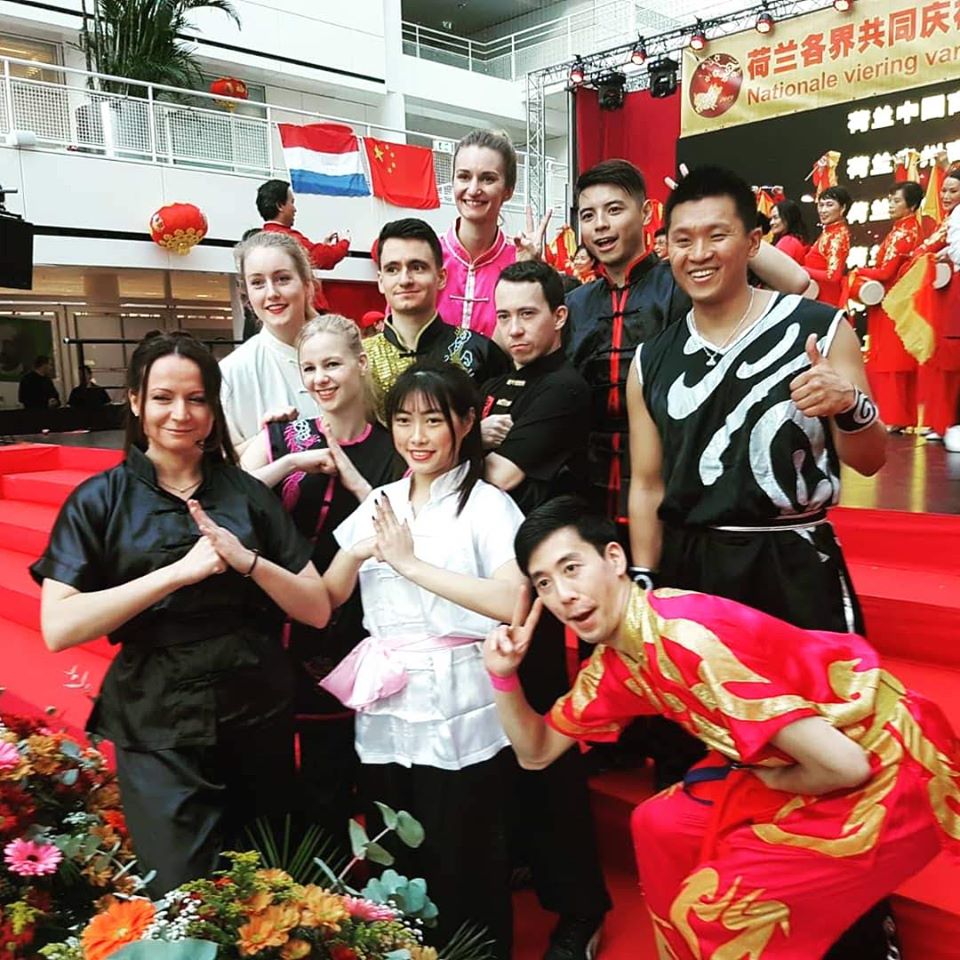A Dutch Wushu school founded by Shaobo Tang
About
The School
Ying De Men is a Wushu school founded by coach Shaobo Tang in 2005
and is currently located in Leiden and SVU (Sportcentrum Vrije Universiteit)
in Amstelveen in the Netherlands. Ying De Men in Chinese is '英德门' and has a double
meaning to it: ‘Ying’ (英) stands for outstanding and heroic, but it is also
short for England; ‘De’ (德) stands for virtue and morality, but it is also
short for Germany; and ‘Men’ (门) means clan or faction, but it also means doorway.
Adding this together will create the full meaning of Ying De Men: the clan or
faction of the outstanding, heroic and virtuous that is forming a doorway between
England and Germany (so, in the Netherlands).
Coach Shaobo started the school originally in the University Sports Centre (USC) of
the University of Amsterdam. After 6 years he moved Ying De Men to the Sports Centre VU.
This school is one of the few Wushu schools in the Netherlands with an official
competition wushu carpet. Since 2022 he has started another location in Leiden.
The lessons are taught in Dutch, English and Chinese (Mandarin).
The Coach: Shaobo Tang
Shaobo has been practising Wushu for more than 20 years and has won multiple Dutch national championships. He has also won 2 European Championship bronze medals and became 10th of Wushu World Championships. Besides that, he was an official Dutch Wushu Team member, Dutch Olympic Committee*Dutch Sports Federation (NOC*NSF) status athlete and is an International Wushu Federation (IWUF) certified grade A judge. Lately he has been contributing towards the growth and betterment of wushu development as an official and has been appointed as a member of the athletes committee for the International Wushu Federation (IWUF) and chairman of the athletes committee for the Wushu Kungfu Federation of Europe (WKFE). He has dedicated his life to training Wushu at top level and frequently goes to Chinese Provincinal teams (like Shandong Wushu team, Shanghai Wushu team etc.) to learn and train to better himself. His most noticeable teachers are:
He has been teaching since 2005 to nurture more talented athletes and dedicating himself to make Wushu better known and established in the Netherlands.

Wushu
Wushu (武术, wǔshù) is an exhibition and full-contact sport derived from traditional Chinese martial arts.
The term wushu is a combination of two Chinese characters: wu (武) = military or martial, and shu (术) = art.
Wushu is also known through the more general yet inaccurate term of kungfu or gongfu (功夫, gōngfu), which is a
combination of gong (功) = work or achievement, and fu (夫) = man. Together this is translated as work and time spent;
this is to describe anything that one has to dedicate time, effort, and energy to accomplish, often being exactly
the practice of martial arts. It is important to realize that Wushu is both a martial practice for self-defense,
with each movement having applications in real life scenarios. Also, it is physically and mentally healthy;
through practice, one learns discipline and develops a clear mind.
Wushu Styles
Wushu was developed in China after 1949, in an effort to standardize the practice of traditional Chinese martial arts and has since been evolving its two disciplines: taolu (套路, forms) and sanda (散打, sparring). Taolu consists of two main fist styles: changquan (長拳, long fist) and nanquan (南拳, southern fist).
Changquan is the most common style in competitions. This style is influenced by traditional northern styles, such as Shaolinquan
and Huaquan, and focused on speed, power, accuracy, and flexibility. Nanquan, on the other hand, is a style focused
on vigorous, athletic movements with very stable, low stances. This style is inspired by southern styles, mainly Hung Gar, Choy Li Fut,
and Wing Chun. Furthermore, multiple weapons within Wushu can be practiced, such as the double-edged sword (剑, jian), the
single-edged sword (刀, dao) or the staff (棍, gun).
Ying De Men Training
Ying De Men teaching focuses on taolu, both northern and southern styles. A new student typically spends the first few months learning basic kicks and movements along with Wu Bu Quan (the 5 stances form). After these have been practiced to an adequate level, the elementary changquan routine 3 will be taught. This form involves more advanced moves which consequently require higher accuracy and stamina. Once a good level of the form has been reached, students can focus on their preferred style (northern or southern) and hence learn more advanced movements and forms along with a weapon suitable to the particular style. Students are encouraged to perform their best and to participate in the yearly competitions hosted in the Netherlands.
Training sessions are 1.5 or 2 hours long and usually consist of 5 minutes warming up, 15 minutes of dynamic stretching, followed by 30-45 minutes of basic kicks and movements/jumps, and lastly 30-45 minutes of form learning or practising,








